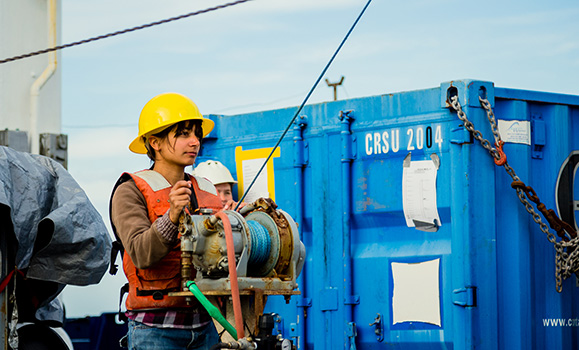It’s the start of a bold new chapter in Dalhousie’s legacy of ocean research excellence and impact.
The Government of Canada has announced Dalhousie University will receive $154 million from the Canada First Research Excellence Fund (CFREF) grant program to embark on the most intensive investigation ever into the ocean’s role in climate change.
The Hon. François-Philippe Champagne, Canada’s Minister of Innovation, Science, and Industry, announced the historic investment — the largest research grant Dal has ever received — at an event in Montreal Friday morning (April 28).
The Dal-led research program receiving the funding, titled Transforming Climate Action: Addressing the Missing Ocean, is set to bring an ocean-first approach to climate science, innovation and solutions. It unites more than 170 researchers across Dalhousie and its partner institutions Université du Québec à Rimouski, Université Laval and Memorial University of Newfoundland. And with additional investment activated by this CFREF grant bringing its total funding to nearly $400 million, it represents a monumental financial contribution to Canada-led climate science.
“I want to thank the federal government for this significant investment, the largest ever made in research at Dalhousie,” says Dr. Frank Harvey, president and vice-chancellor (acting). “As Canada’s leading ocean research university, with a team of more than 100 ocean-focused researchers and world-leading ocean research centres, we’re thrilled to partner with Laval, UQAR and Memorial to address the challenge of Transforming Climate Action and to undertake this critically important research.”
Learn more: transformclimateaction.ca
Shifting global conversation and action
The global ocean holds 90 per cent of the Earth’s carbon and has absorbed 40 per cent of fossil fuel emissions to date. It removes more CO2 from the atmosphere than all the Earth’s rain forests combined. But emerging science shows the ocean’s ability to absorb and hold carbon is changing in ways we don’t understand.
“The ocean is protecting us against the worst impacts of a warming planet. But exactly how, and for how long it can do so, are critical scientific questions that need answers urgently,” says Dr. Anya Waite, Dalhousie’s associate vice-president (ocean) and scientific director and CEO of Dalhousie’s Ocean Frontier Institute. “Without a better understanding of the ocean’s role in mitigating global warming, our efforts to meet global climate targets and avert the worst impacts of climate change are at serious risk.”
Transforming Climate Action brings together researchers at the four partner universities spanning diverse disciplines such as oceanography, atmospheric science, Indigenous scholarship and knowledge, engineering, data science, maritime law, immigration policy, and social justice.
The scientific strategy for Transforming Climate Action has three key objectives:
- Reducing uncertainty
Through unprecedented data collection and analysis of the North Atlantic carbon sink — a critical ocean system that absorbs 30 per cent of carbon taken in by the global ocean annually — Transforming Climate Action will reduce uncertainty about the ocean’s role in climate change to enable improved climate change forecasting and better climate and regional adaptation strategies and develop new technology to transform how we conduct ocean research.
- Mitigating climate change
In addition to developing approaches to reduce ocean-sector emissions, the partner universities will collaborate with Indigenous, industry, and community organizations to safely and responsibly advance the science, technology, and enterprises to position Canada as the global leader in ocean-based carbon dioxide removal science and innovation for climate mitigation.
- Adapting equitably
Transforming Climate Action researchers will advance people-centric adaptation to ocean and climate change based on science, co-designed with communities, and informed by Indigenous ways of knowing, social impact assessment, advances in education and information sharing, changes to legal and regulatory frameworks, and the deep connection coastal communities have with the ocean.
“Transforming Climate Action will focus the world’s attention and energies on the primary importance of the ocean in determining climate policy, shifting the global discourse and positioning the partner institutions as leaders in evaluating and mitigating the impacts of climate change,” says Dr. Alice Aiken, Dalhousie’s vice-president of research and innovation.

Ruth Musgrave. Canada Research Chair in Physical Oceanography at Dalhousie University.
A collective approach
Dalhousie’s Ocean Frontier Institute (OFI) will play an integral role in the leadership and management of Transforming Climate Action, connecting researchers to a global community focused on climate-ocean science, policy, and advocacy. With the support of 40 national and international partners, including industry, research, government, and NGO partners, and deep institutional connections with Indigenous peoples and communities in Atlantic Canada and Quebec, the partner institutions are uniquely prepared to bring a collective approach to climate action.
As part of this effort, Transforming Climate Action will allocate significant funding for Indigenous-led research and will build on deep existing knowledge and research by Indigenous researchers, communities, and organizations in the areas of climate change and mitigation. Indigenous-led research partnerships will ensure that science and policy recommendations are guided by Indigenous values and traditional knowledges.
“Our relationship with the ocean is an ancient one, built on balance, respect and knowledge passed down from generation to generation,” says Angeline Gillis, executive director of The Confederacy of Mainland Mi’kmaq, an official partner of Transforming Climate Action. “The resources provided by Transforming Climate Action will provide a unique opportunity to bring together our common experiences and understandings of the Ocean, in a partnership that will ensure we move towards a sustainable future for our children.”
Information scientist Dr. Mike Smit, acting dean of the Faculty of Management, will lead the data management project central to the Transforming Climate Action research program. He explains that it’s through global partnerships that Transforming Climate Action will identify and bring together the data required to advance novel ocean-climate research and outcomes.
“The ambition is not just to enable strong research, but to mobilize data to create a better-informed country, better-informed policies and a transformative effect on how we respond and manage the ocean-climate nexus,” he says.

Dr. Rachel Chang, right, Canada Research Chair in Atmospheric Science in Dalhousie.
Dr. Charles Macdonald, dean in Dalhousie’s Faculty of Science, says the global reputation of Dal’s ocean and climate researchers has been critical in helping the university garner initial commitments and partnerships for the Transforming Climate Action research program.
“Because of our legacy for innovation and leadership in ocean research, the world knows we have the depth and talent to take on this work,” he says. “With the support of the CFREF, our partners see we are gathering significant momentum and are throwing their support behind us to get it done.”
Sharing news of the CFREF funding announcement with the Dal community via email, Acting President Harvey and Vice-President Aiken celebrated the achievement and looked ahead to the work Transforming Climate Action is poised to undertake.
“It is through exactly this sort of collaborative research and innovation — spanning disciplines, institutions and even languages — that we can build a better future for our planet,” they said. “Backed by the proven talent of our research community and now powered by an unprecedented level of support, it is a challenge Dalhousie is ready to meet.”
Learn more about Transforming Climate Action: transformclimateaction.ca
From the partners…
François Deschênes, Rector, Université du Québec à Rimouski
Pooling our expertise has allowed the partner universities to develop an innovative, solution-oriented research program to address social and environmental challenges affecting the oceans and climate. Thanks to the support of the federal government, we will take giant steps forward together with the CFREF program. New knowledge will emerge from this ambitious program, which will contribute to Canada's leadership in the fight against climate change.
Sophie D’Amours, Rector, Université Laval
Even though the crucial role of oceans in regulating global temperature is no longer in question, it remains urgent to better understand the complex mechanisms behind this process in order to alleviate the consequences of a rapidly changing climate. The world-class ocean research expertise and infrastructure of Université Laval, combined with those of the other major partners in this large-scale project, will help improve climate change forecasting and develop adaptation strategies tailored to the needs of impacted communities.
Dr. Tana Allen, vice-president (research), Memorial University
Scientific collaboration is the key to finding real solutions to urgent issues facing our planet. Recognized as an international leader in ocean innovation, Memorial brings unparalleled research strengths to this ambitious project. Our scientists and scholars are delighted to continue working with Dalhousie University and our partners to lead scientific breakthroughs and provide key insights into the ocean’s role in climate change.
Also announced…
As part of Friday’s announcement, the Government of Canada announced CFREF funding for Concordia University’s research program titled Electrifying Society: Towards Decarbonized Resilient, in which Dalhousie will serves as a partner institution. The project aims to develop novel solutions and innovative technologies to tackle climate change and drive sustainability research. A group of Dalhousie battery researchers, including Dr. Jeff Dahn, NSERC/Tesla Canada Inc. Industrial Research Chair and Canada Research Chair (CRC) in Materials for Advanced Batteries, will partner with the Concordia team in the development of advanced, low-cost, environmentally friendly batteries for buildings and mobile applications such as electric vehicles.
Dalhousie Schulich School of Law professor Dr. Aldo Chircop is also a supporting researcher in Memorial University’s CFREF-funded project, Qanittaq Clean Arctic Shipping Initiative. Co-led and co-developed with Inuit Circumpolar Council (ICC) Canada, the project will address and respond to concerns about Arctic shipping and related environmental impacts affecting Northern communities.

